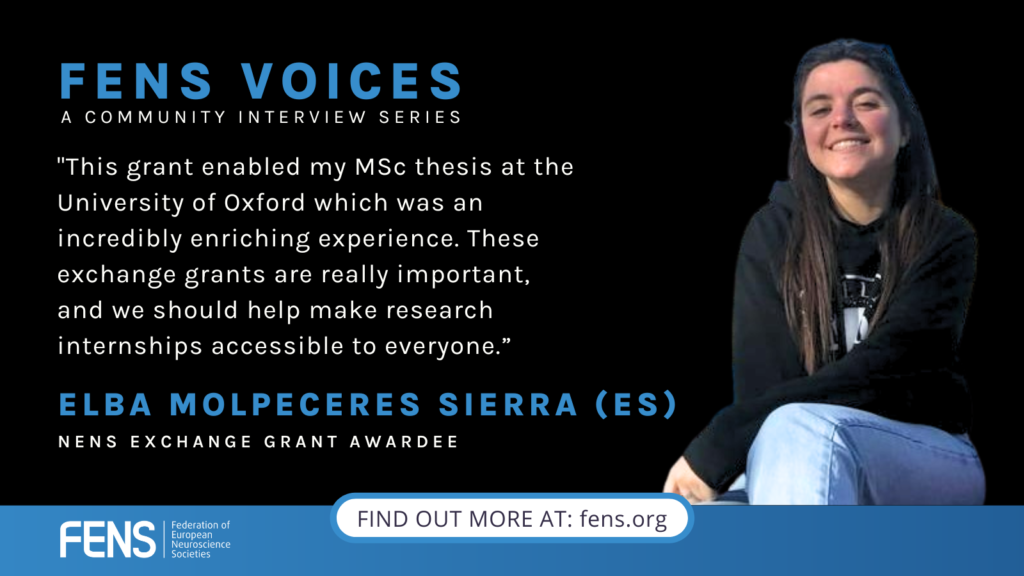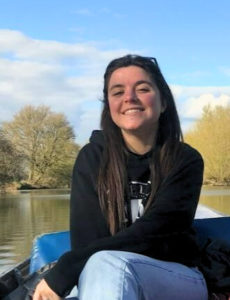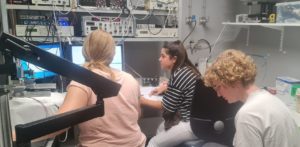
FENS Voices | Elba Molpeceres Sierra: A strong motivation and a clear vision
06 December 2023
FENS News, Neuroscience News, Society & Partner News
FENS is dedicated to supporting early career researchers to further themselves and their first neuroscience projects. We reached out to NENS Exchange grant (now FENS/IBRO-PERC Exchange Fellowships Programme) awardee Elba Molpeceres, to find out more about her experience in the famous Richard Wade-Martins laboratory, studying Parkinson’s Disease and to know more about her current interests. Elba is currently a PhD student at the Institute of Neurodegenerative Diseases at Bordeaux Neurocampus. She did her BSc in Biochemistry in her home country of Spain, at the “Universidad Autónoma de Madrid”. Afterwards, she completed her MSc in Neuroscience at the University of Bordeaux. Currently, she is part of the Monoamines, Parkinson and Pain group, under the supervision of Dr Abdelhamid Benazzouz. Her research focuses on the characterisation of the involvement of the subthalamo-cortical neuronal pathways in motor and pain symptoms in Parkinson’s Disease. She hopes that her work will contribute to the understanding of the circuitry underlying this disease and to the future development of improved therapeutic strategies. Read the full article below.

What sparked your interest in science?
EMS: My interest in science started to develop spontaneously at a very young age, but this interest was definitely encouraged by several people in my family being scientists. My father, especially, has always encouraged me to ask the right questions about the world surrounding us and has potentiated the necessary curiosity to answer them.
From the beginning, my scientific interest was centred on the human being and its functioning. I remember that being very young, on a museum visit, there was a gigantic brain sculpture where you could enter and look at a simulation of the neurons and the connections between them. At that point, I thought that it would be very cool to be able to really “be inside” our brain and try to understand how it works. Over the years, I realised that this is what neuroscience does: it uses different approaches. This is how I ended up knowing that was going to be my road.
What area of neuroscience did you find most fascinating?
EMS: When I first started being interested in neuroscience, it was originally centred on the functioning of the brain in terms of decision-making, memory functioning … Of course, at that time I didn’t know how to name this, and it was more about asking myself several questions. What determines us to make certain choices in a given situation? How can it be possible that we are able to memorise hundreds of pages for an exam, but at the same time forget about what we had for dinner last night? However, as I first started to really study neuroscience for the BSc, a change occurred, and the questions started to be more about how is it possible that due to a certain disease you can lose these memories? How come the degeneration of a certain type of neurons can give rise to such a huge variety of symptoms as we found in Parkinson’s Disease? How is it possible that with all the advancement in other areas of biomedical research, these diseases are still so little understood? My interest started to focus on neurodegenerative diseases, their understanding and the development of treatments.
Who is your favourite scientist and why?
EMS: It is difficult to choose only one. But at this point I can say that I look up to all those women who have managed to develop successful careers and build names for themselves, overcoming the obstacles and difficulties that being a woman in science implies and becoming reference figures for the rest of us. As an example, I really like the work of María Llorens, in the Centre of Molecular Biology Severo Ochoa. Her group researches adult neurogenesis and its regulation during physiological and pathological aging. Since adult neurogenesis has been shown to be impaired in several brain disorders, their work also focuses on how to implement this knowledge in potential therapeutic strategies, which I believe to be a very promising approach.
How did your BSc go? What did you love most? Which courses didn’t you specifically like (if any) and why?
EMS: I did my BSc in Biochemistry at the “Universidad Autónoma de Madrid”. What I enjoyed most was the great variety of topics that we covered, on a large scale, from molecules and their structure and function to metabolism, organ systems, pathologies and bioinformatics. If I had to choose any that I liked less, I would say organic chemistry. The initiation provided and the learning process that I needed to do in the case of this specific subject were very different from everything that I had done before, and it was probably the hardest one for me during the whole period of my studies.

Going to university during COVID-19 must have been challenging. How was studying neuroscience during this time while the world stood still?
EMS: I was just in the middle of my BSc thesis when the pandemic started. I was lucky because I had enough results to start the analysis and the writing, but I know it was a big problem for a lot of people who had to switch to a bibliographical project. On one hand, since I had more time, I found it easier to completely understand the analysis pipeline and make a good story with the data I had. I corroborated this during my first year of MSc, when quarantine and curfews were still going on in France. It is really important to be able to have a good mental state in order to do your job properly, or just to focus and this is something not easy to achieve in the middle of a worldwide pandemic.
You are currently pursuing a PhD at Bordeaux Neurocampus in France. What is the topic of your PhD thesis?
EMS: My main interest in neuroscience was soon focused on research in neurodegenerative diseases. During my MSc, due to the insight I got during my first internship, I decided that I wanted my PhD thesis to be focused on Parkinson’s disease. More specifically, I became interested in its mechanisms at the level of systems neuroscience, circuitry and therapeutic approaches. The topic of my PhD is the characterisation of the subthalamo-cortical pathways and their involvement in the pathophysiology of Parkinson’s disease. The goal is to understand the involvement of these neuronal pathways, that travel from the subthalamic nucleus to different cortical areas, in parkinsonian motor and nociceptive symptoms. To do this, I will use cutting-edge techniques such as chemogenetic or optogenetic manipulation during behavioural paradigms, in vivo electrophysiological recordings and neuroimaging approaches. A better understanding of the pathophysiological mechanisms involving these circuits is mandatory in order to offer improved suitable therapies for PD, and that is our objective.
What project are you most proud of up to this point?
EMS: I am really proud of the project I did during my first MSc internship. In only 5 months, we obtained incredibly interesting and novel results on the involvement of the pathway from the subthalamic nucleus to the primary motor cortex in Parkinson’s disease. This allowed us to set the ground for my PhD project and the data obtained during that time is right now in preparation for publishing.
Being an early career neuroscientist is not always easy. Are you currently jumping any hurdles and if so, how do you tackle your problems?
EMS: Recently, I experienced a couple of months during which some of my experiments were not working as planned due to unforeseen circumstances and this coincided with a major personal problem outside the lab. PhDs always have their ups and downs, but when the downs overlap with difficult periods of your life outside the lab, the situation can be challenging. The lesson I obtained from this is that sometimes unpleasant situations are going to happen, and you need to have the resilience necessary to confront them and it helps if you have a strong motivation and a clear vision of what you want. It is also important that the people surrounding you in the lab are willing to help you and defend your interests. Even in small day-to-day problems, it really helps to maintain your focus on your milestones and to surround yourself with the right people.
In 2022 you were awarded a NENS Exchange grant. Did it have a positive impact on your career? Why are exchange grants important especially for early career researchers?
EMS: Absolutely! This grant enabled my MSc thesis at the University of Oxford in Richard Wade-Martins laboratory, which was an incredibly enriching experience in a world-leading laboratory in Parkinson’s disease. These exchange grants are really important, and we should help make research internships accessible to everyone. It is an incredible experience to have the possibility to travel abroad, learn different work cultures, go to places where innovative techniques are being developed and surround yourself with top experts in the topic that you are interested in. I would really encourage anyone who is thinking about applying for one of these grants to do it. I have been lucky enough to work in labs in 4 different countries since I started my scientific career, and each experience has contributed something unique to my formation as a scientist.
Imagine yourself being a PI and benefiting from unlimited resources. What would your research be focused on? What do you hope to achieve with your work?
EMS: My research would still be focused on neurodegenerative diseases, probably Parkinson’s disease. The objective of my research would be to try to achieve the maximum understanding about Parkinson’s disease pathological mechanisms and discover how to apply this knowledge in the search for therapy. With unlimited resources, I would like to target these questions from several points of view and different levels of research. In my opinion, research nowadays is very dissected, everyone is focused on their own level of analysis and their own techniques: molecular, cellular, systems and computational. I understand nowadays it is very difficult to keep track of all the new findings and all the advancements in your topic of interest from all perspectives, but with enough resources and people, I believe efforts could be summed up to try to achieve a global vision of the research topic and tackle a solution from a multidisciplinary perspective.